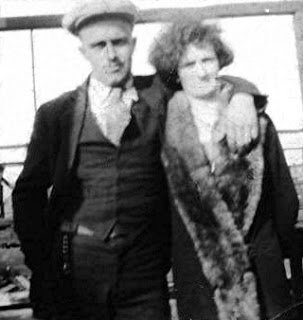Donald Lester Dewey
In my last
Mumblings posting, I wrote about Katherine Skeffington Dewey (my grandmother)
and the effect her husband's (Francis Osman) early death had on her. I’m sure it had an effect on all her children
as well. I know some of the effect it had
on her youngest child Donald, my father, and I will write on that in this first
post on him.
Donald was
born on February 16, 1912 at Reading, MA.
By the time he was six years old in 1918 and maybe before that, his
father was institutionalized. We can
assume that Francis Osman was going through significant crises in his life
before 1918. So, it is also safe to assume
that from an early age, Donald was raised without a father in his life. His mother was left to find a way to provide
for him and his siblings, Elizabeth, Marion, and Robert.
The Pre-Adult Years
The Dewey family lived at 5 Morgan Park, Reading from 1905 until 1914. Donald was born February 16, 1912. A few years later (about 1915), the family move to 14 Hancock
Street, Reading. Then from 1921 until 1926/27 he lived at 38 Mineral
Street. (His mother and siblings continued to live on Mineral Street until 1930.) The earliest photo I have of Donald is from a 1922 Reading
school photo that I bought on eBay. He
had said he went to the Highland School and I think I found him in the group
pupils. He would have been 10 years
old. He completed 8 years of school in Reading (from WWII USN separation records).
Around
1926/27, his mother sent him to live with a family (presumed to be the Gaffneys) in New Jersey where four years later (1931), he graduated as
an apprentice printer compositor (from WWII USN separation records). She probably felt that she could not tame him and that he might have a chance to move along in his life if he learned a trade. So, from about
the age of 14/15, he was separated from his family and living on his own for many years. I have many pictures from a Gaffney family sent to my father during WWII. One of the pictures was taken in front of a building with "B. Gaffney Printing" in the picture. I assume that it was at this printing company that Donald apprenticed. Donald’s apprenticeship ended at around the
same time as the Wall Street Crash of October 1929 and the Great Depression. I was told that his family had tried to get
him a job through a family contact at the Boston Herald newspaper. Given the economic times, the job never
materialized. During the Great Depression which lasted until the start of World War II, the unemployment rate in this country was over 25% (Wikipedia) and Donald wasn't able to find employment locally.
 |
| 1922 Highland Street School (Donald circled) |
 |
| Donald (2nd from right) - Apprentice Printer |
 |
| Donald (about 19 years old) - Graduation from Printing Apprenticeship |
My
father
did not talk a lot about his childhood but the few stories he told lead
me to
believe that he and the group of boys he hung around with frequently got
into
trouble. I remember him telling a story
of he and his friends lighting a wagon of hay on fire one night and
rolling it
down the Mineral Street hill. He lived his
early childhood near the railroad tracks in Reading and said he would
hop
aboard freight cars and disappear from home for days at a time.
The Early Adult Years
My brother remembers a story that Donald was given a nickel to buy a loaf of bread. He left home and joined a circus. He was gone for several years, but when he finally returned home, he walked into the family house with a loaf of bread. I believe that this event would have been in the early 1930's during the depression and after completing his printing apprenticeship. He told me that at one time he worked as a pin boy at a bowling alley. This was a dangerous job he said as the pins would fly everywhere when struck by the bowling ball.
The Early Adult Years
My brother remembers a story that Donald was given a nickel to buy a loaf of bread. He left home and joined a circus. He was gone for several years, but when he finally returned home, he walked into the family house with a loaf of bread. I believe that this event would have been in the early 1930's during the depression and after completing his printing apprenticeship. He told me that at one time he worked as a pin boy at a bowling alley. This was a dangerous job he said as the pins would fly everywhere when struck by the bowling ball.







